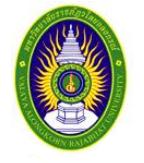Valaya Alongkorn Rajabhat University under the Royal Patronage is one of the leading educational institutes of Thailand. VRU was established to improve the livelihoods of the local communities in the Southeast Asian region. For more than 79 years, VRU has been committed to the ongoing development of its programs, human resources, facilities and services. VRU is gradually moving towards international standards in quality of research, community services and the promotion of culture.
The university students range from undergraduates to doctoral degree candidates. The wide variety of study programs that are provided not only accommodate their academic interests and career aspirations, but also prepare them to meet the challenges of a knowledge-driven global economy. VRU also recognizes the importance of further education at the postgraduate level for government staff and private employees, as well as for staff in general employment. The diverse programs offered by VRU have not only enabled individuals to upgrade their capabilities, but have also provided research information relevant to local and national needs.
To remain relevant and successful, VRU has built and continues to build learning networks at home and abroad. Working together with other institutions, VRU is developing initiatives and systems for resource sharing which will result in mutually enhanced effectiveness and better lives for our people.
Valaya Alongkorn Rajabhat University under the Royal Patronage (formerly Petchburiwittayalongkorn Teachers College) was established on 4 June 1932. It was named after the founder, Her Royal Highness Princess Valaya Alongkorn Krom Luang Petchburi Rajsirindhorn, who was one of His Majesty King Chulalongkorn’s daughters. She donated a plot of land on Petchburi Road in Bangkok to found the Petchburiwittayalongkorn Teachers Training School.
Later in 1937, the name was changed to Petchburiwittayalongkorn School for Girls; however, the part of the name “for Girls” was omitted when it became a co-ed school in1946.
It was developed into a teachers college on 1 October 1970. In 1972, the college was extended to its present site at Km 48 Phahonyothin Road, Klongluang District, Pathum Thani Province, with an area of 294 rai (2.53 rai = one acre)
On 14 November 1974, the college was granted permission to be under the Royal Patronage of His Majesty King Bhumibol Adulyadej (Rama IX), the present King. According to the 1975 Teachers College Act, the college could offer Certificate and Bachelor’s degree programs.
On 14 February 1992, His Majesty the King gave the title “Rajabhat” to all Teachers Colleges in Thailand and permitted them to use His Royal Emblem as each college’s seal. Thus, the name of the college was changed to Rajabhat Institute Petchburiwittayalongkorn.
Three years later on 24 January 1995, the Rajabhat Institute Act was passed thereby extending the institute’s academic provisions to post-graduate levels.
On 20 September 2003, the name of the institute was changed to Rajabhat Institute Valaya Alongkorn. On 15 June 2004, the Rajabhat University Act was passed thereby upgrading the institute to become Valaya Alongkorn Rajabhat University.
Vision
Valaya Alongkorn Rajabhat University under the Royal Patronage is a leading university established to improve livelihood in local communities in the Southeast Asian region.
Mission
Valaya Alongkorn Rajabhat University under the Royal Patronage aims to perform the functions based on Article 7 and Article 8 of the Rajabhat University Act in 2004 as follows:
Article 7: The university is a higher educational institution with a mission to develop region, to reinforced the nation’s wisdom, to restore the power of knowledge, to glorify the local wisdom, to create arts for people’s strong and stable progress, and to participate in managing, restoring and utilizing natural resources and environment. It also aims to provide academic services, promote higher professional services, provide academic courses, and perform research, and provide academic services for the society. In addition, it aims to improve, disseminate and develop technology, to restore culture and arts, as well as generating instructors and developing their qualifications.
Article 8: To reach the goals mentioned in Article 7, the university aims to perform the following functions:
- Discover knowledge and facts to achieve academic quality based on local wisdom, Thai wisdom, and international wisdom.
- Produce graduates with high qualifications, ethics, and appreciation of being Thai, as well as encouraging the graduates to love and bond with their homeland. Moreover, the university will promote the life-long learning in a community in order to comprehend changes of society. As a result, the number and quality of graduates have to be in accordance with the national scheme for graduate production.
- Support knowledge, understanding and pride in local and national culture.
- Increase the knowledge and strength of the community leaders, religious leaders, and local politicians by promoting democratic consciousness, virtues, and ethics as well as the ability of local communities to organize for the benefit of the public.
- Strengthen the capability of the teaching profession to produce and develop the quality of the instructors and academic staff to meet the criteria of the nation and higher professions.
- Collaborate with other universities, communities, and local administrative organizations, including other internal and external organizations for local development.
- Identify and study the methods of local technology and up-to-date technology development in accordance with people’s regional ways of life and professions. Furthermore, the university will discover effective promotional methods of managing, conserving and utilizing natural resources and the environment with sustainability and balance.
- Study, perform research, promote and follow the guidelines of the Royal Project implementations as the university’s mission for local development.
Faculty
- Faculty of Education
- Faculty of Science and Technology
- Faculty of Humanity and Social Sciences
- Faculty of Management Science
- Faculty of Industrial Technology
- Faculty of Agricultural Technology
- Graduate School
- College of Innovation


